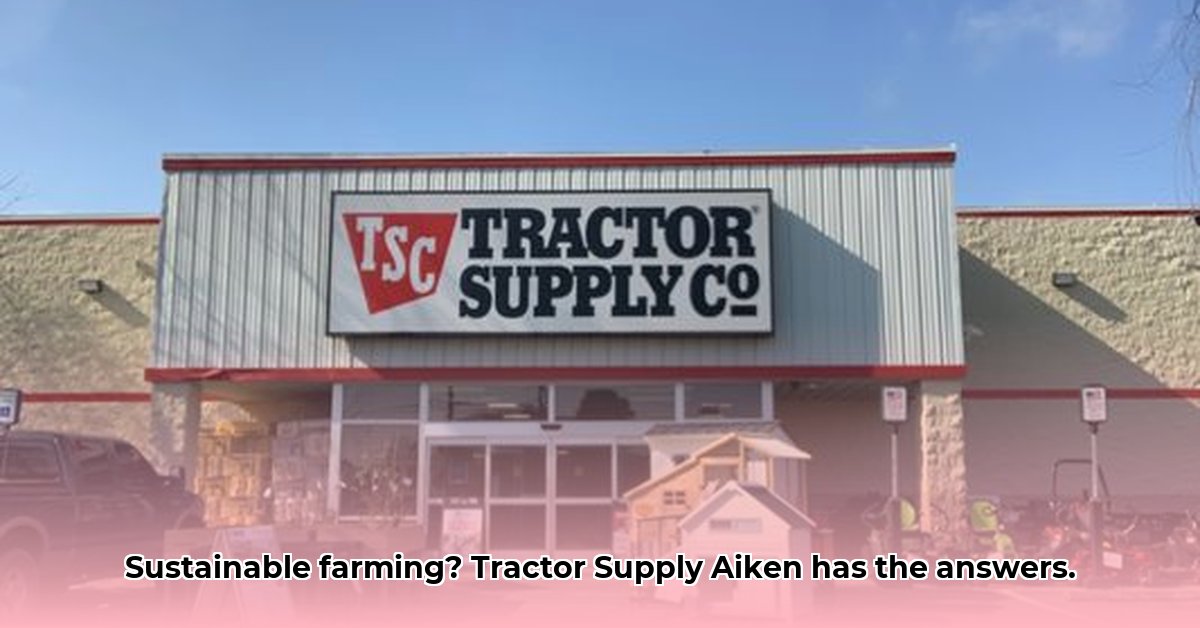
Tractor Supply (TSC) in Aiken, South Carolina, plays a significant role in the local agricultural landscape. This article explores TSC Aiken's contribution to sustainable farming, examining its product offerings, assessing its sustainability efforts, and outlining actionable steps for all stakeholders to foster a greener future. Ultimately, we'll uncover how TSC can better support environmentally conscious agricultural practices in the Aiken community. For more information on TSC's equipment, check out their lawn tractor selection.
TSC Aiken's Product Offerings: Tools for Sustainable Practices
TSC Aiken offers a wide array of products relevant to sustainable agriculture. For livestock farmers, this includes organic and locally sourced feed, supporting both animal welfare and responsible land management. Durable fencing materials facilitate rotational grazing, a key sustainable livestock farming technique. Gardeners benefit from a selection of organic seeds, fertilizers, and pest control solutions, promoting homegrown food production without harmful chemicals. While not inherently "sustainable" in their origin, these products, when chosen and used wisely, can assist in environmentally friendly farming.
Assessing TSC's Sustainability Efforts: A Call for Transparency
While TSC Aiken provides crucial supplies for sustainable agriculture, a lack of accessible information regarding their own sustainability initiatives presents a significant concern. Information regarding sourcing practices, supply chain environmental impact, and waste management strategies is limited. This lack of transparency hinders a complete evaluation of their overall contribution to sustainable agriculture. This isn't about criticizing TSC, but rather about motivating them to become a leader in sustainability, showcasing their commitment to environmental responsibility. Aren't transparent and accountable practices vital for building trust with consumers and fostering a sustainable agricultural future?
Actionable Steps for a Greener Aiken: A Collaborative Approach
Driving meaningful change necessitates a collaborative approach, engaging all stakeholders:
1. TSC Aiken Staff:
- Step 1 (Short-term): Implement comprehensive training programs on sustainable agriculture practices. This empowers staff to effectively advise customers on eco-friendly options.
- Step 2 (Long-term): Partner with local sustainable agriculture organizations to host in-store workshops and educational events. This fosters community engagement and provides valuable resources.
2. Local Farmers:
- Step 1 (Short-term): Prioritize purchasing sustainable options from TSC Aiken. Consumer choice drives market demand for eco-friendly products.
- Step 2 (Long-term): Actively engage with TSC Aiken management, providing feedback and suggestions regarding product sourcing and labeling. Demand clear labeling on sustainable sources and environmentally friendly production methods.
3. TSC Corporate:
- Step 1 (Short-term): Conduct a comprehensive and transparent audit of the entire supply chain, identifying areas for improvement. Publish the findings openly.
- Step 2 (Long-term): Develop and promote programs that explicitly encourage and support sustainable agriculture among customers. This might include partnerships with local organizations and incentives for purchasing sustainable products.
4. Consumers and Gardeners:
- Step 1 (Short-term): Become informed consumers. Read labels, choose products with minimal packaging, and prioritize sustainable alternatives whenever possible.
- Step 2 (Long-term): Engage actively with TSC staff and management. Request detailed information on product sourcing and express your preferences for sustainable options.
The Future of Sustainable Agriculture in Aiken: A Shared Responsibility
TSC Aiken possesses significant potential to spearhead sustainable farming practices in the Aiken area. However, achieving this requires transparency from the company, commitment from corporate leadership, and active participation from all stakeholders. By fostering collaboration and prioritizing sustainability, we can cultivate a more environmentally responsible and thriving agricultural community. Let's work together to shape a sustainable and prosperous future for Aiken's farmers and the land they cultivate. What steps will you take today to support a greener tomorrow?